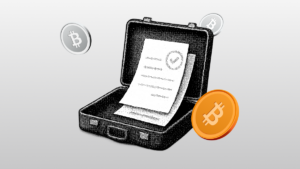
Bitcoin ETFs
Bitcoin ETFs, or exchange-traded funds, provide a more traditional means of buying Bitcoin. They are investment funds that track the price of Bitcoin and are traded on stock markets, just like stocks. This allows traditional investors to gain exposure to Bitcoin prices without holding the cryptocurrency.
There are two main kinds of Bitcoin ETFs:
- Bitcoin futures ETFs: A Bitcoin futures ETF is like a bet on how the price of Bitcoin will change in the future.
- Bitcoin spot ETFs: Similar to buying actual Bitcoin, but through a fund and without direct ownership.
Cryptocurrency exchanges
Unlike Bitcoin ETFs, cryptocurrency exchanges like bitcoin.com.au provide a more direct and hands-on method of investing in Bitcoin. They are platforms where investors can:
- Buy and sell digital assets like Bitcoin
- Have direct ownership and control over their investments
- Actively manage the exchange of Bitcoin and other digital assets
Comparing Bitcoin ETFs and exchanges
Having laid out the basics of Bitcoin ETFs and exchanges, we can now evaluate them based on the following:
- Accessibility
- Convenience
- Fees
- Security
- Regulation
Neither option is superior; it depends on the individual investor’s circumstances and goals. Let’s delve into this comparison in more detail.
Accessibility
Bitcoin ETFs
Bitcoin ETFs may not accurately reflect the price of Bitcoin. Factors such as market liquidity and the settlement process of Bitcoin futures can influence the performance of a Bitcoin ETF, potentially leading to tracking errors. For instance, if the price of a new contract for a Bitcoin future is higher than the price of the expiring contract. This can cause a situation known as contango, which may lead the ETF to track the price of Bitcoin inaccurately.
For investors familiar with traditional finance, EFTs may be the preferred option. They can be traded within existing brokerage accounts, making Bitcoin ETFs an easy addition to existing investment portfolios.
Crypto exchanges
If you’re not as familiar with traditional finance or want more control over your crypto investments, a crypto exchange may be a better option. Since crypto exchanges are designed explicitly for crypto, they’re often more straightforward for customers who simply want to buy or sell Bitcoin and crypto directly. While this means creating a new account, platforms like bitcoin.com.au offer free integrated crypto wallets and app features that enable you to manage your crypto easily.
Convenience and flexibility
Bitcoin ETFs
ETFs are traded only during stock market hours, which might be inconvenient for people who want to respond more quickly to sudden changes in the 24/7 crypto market. Crypto’s volatility means price movements often happen outside market hours, leaving ETF investors unable to react instantly.
It is also important to remember that on a Bitcoin ETF, you don’t own Bitcoin itself; you own shares in a fund that tracks Bitcoin’s performance. You can’t transfer or use Bitcoin for transactions or other blockchain applications. This is an excellent option if you want to buy and hold an interest in Bitcoin, but it limits your options if you want to be more active. For example, after noticing they were pumping, you couldn’t directly trade Bitcoin for Ethereum, Solana or Dogecoin.
Crypto exchanges
Conversely, crypto exchanges are always open. You can trade, buy, or sell Bitcoin anytime, making exchanges more convenient.
Imagine being in the U.S. when Dogecoin shot up after President Trump announced the Department of Government Efficiency (D.O.G.E.) on November 12. The price explosion wasn’t limited to stock market hours—it skyrocketed well into the night, catching daytime traders off guard. Similarly, Elon Musk’s infamous late-night tweets, like ‘Doge to the Moon’, have triggered massive price movements while traditional markets were closed (e.g., sending the price up 20% in a single hour, 50% in a day and 540% across a single month).
Fees and expenses
Both Bitcoin ETFs and exchanges have their own structures when it comes to fees and expenses. Bitcoin ETFs typically charge a management fee, which can vary from approximately 0.10% to 0.25%. These fees are calculated and subtracted from the fund’s total assets, affecting the ETF’s net asset value.
Cryptocurrency exchanges usually charge a trading fee ranging from 0.1% to over 1% on specific platforms. They may also charge additional network fees for transactions moving crypto assets off the exchange, which can fluctuate depending on network congestion and the size of the transaction. While these fees can add up, they may be worth it for investors who value exchanges’ direct control and flexibility. They may also be a better option if the portfolio size increases, as management fees eat away at the portfolio’s total value.
Security and regulation
Bitcoin ETFs
Regarding security and regulation, Bitcoin ETFs and cryptocurrency exchanges operate under distinct regulatory bodies and utilise various security measures. Bitcoin ETFs are regulated in Australia by the Australian Securities and Investments Commission (ASIC), which requires EFTs to provide comprehensive, fair, and honest disclosure. They also use strong security measures to protect investors’ holdings.
Cryptocurrency exchanges
Historically, crypto exchanges have not been as heavily regulated as Bitcoin ETFs. Instead, reputable exchanges like bitcoin.com.au have undertaken their own measures to ensure user protection. We are registered as a Digital Currency Exchange with AUSTRAC and are ISO 27001 and Digital Economy Council of Australia certified. Explore our extensive security features.
Real-life examples of Bitcoin ETFs and exchanges
In order to bring these points to life and provide tangible examples, we’ll explore some notable Bitcoin ETFs and well-respected cryptocurrency exchanges.
Popular Bitcoin ETFs
Until recently, Bitcoin spot ETFs were primarily traded on US exchanges. Blackrock’s ETF Grayscale Bitcoin Trust ETF, the ProShares Bitcoin Strategy ETF, and the Valkyrie Bitcoin Fund are among the most popular Bitcoin ETFs. The Grayscale Bitcoin Trust ETF is a publicly traded Bitcoin fund that provides an investment avenue similar to traditional financial instruments. Meanwhile, the ProShares Bitcoin Strategy ETF is a futures ETF that tracks Bitcoin futures contracts.
Australian investors have received increased access to several Bitcoin exchange-traded funds (ETFs) through the Australian Securities Exchange (ASX) or Chicago Board Options Exchange (CBOE) Australia. These include VanEct Bitcoin ETF, Monochrome Bitcoin ETF, and Blackrock’s iShares Bitcoin Trust. Each of these ETFs offers investors a unique way to gain exposure to Bitcoin, with varying characteristics and fee structures.
Many of these ETFs have attracted significant attention from investors. For instance, BlackRock’s iShares Bitcoin Trust achieved over $1 billion in trades on its first listing day.
Reputable cryptocurrency exchanges
At bitcoin.com.au, we pride ourselves on being a reliable and secure platform for cryptocurrency transactions. Our primary objective has always been clear: establishing the most straightforward and secure avenue for Australians to buy Bitcoin and crypto. But we aim for more than just that. We are dedicated to transforming cryptocurrency technology into robust, regulated financial services while always adhering to the highest standards of integrity.
We take immense pride in serving over 350,000 Australian customers. Our core mission remains unwavering: to be the go-to platform for buying Bitcoin in Australia, uncomplicated and hassle-free. We continually strive to innovate, introduce new features and cultivate partnerships that enhance the value we provide to our customers.
Security is a cornerstone of our operations. We’ve implemented rigorous measures, including 2-factor authentication, ISO 27001 certification, and state-of-the-art underground vaults to safeguard your data and cryptocurrency holdings. Your peace of mind is paramount to us. Therefore, choosing a reputable exchange like ours is crucial, as it can significantly affect your trading experience and the security of your funds.
Frequently asked questions
What is a Bitcoin ETF?
A Bitcoin ETF is a security that tracks the price of Bitcoin and is traded on a stock market. It allows traditional investors to access Bitcoin prices without holding the cryptocurrency.
Is owning a Bitcoin ETF the same as owning Bitcoin?
Investing in a Bitcoin ETF means owning shares of a fund invested in Bitcoin, not the cryptocurrency itself or its cryptographic keys. Therefore, owning a Bitcoin ETF is not the same as owning Bitcoin directly.
What is the disadvantage of buying a Bitcoin ETF?
A Bitcoin ETF might not always match the actual price of Bitcoin because of differences in how easily it can be bought or sold and how it is settled. This means the cost of the ETF could be different from the actual value of Bitcoin, which can be confusing or lead to unexpected results for investors.



